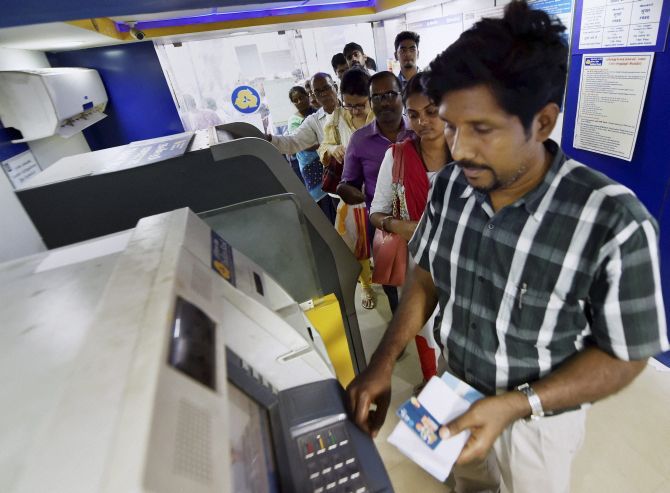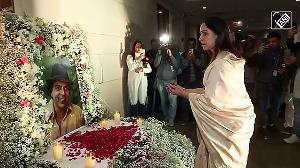
Amid rising anger among people across India over exchanging the scrapped currency, Finance Minister Arun Jaitley on Saturday regretted hardships caused due to withdrawal of high denomination notes but advised the public to be patient as the move will have larger benefits for the economy in long term.
He said it may take up to 3 weeks for all the 2 lakh cash vending ATMs to operate normally as each one has to be calibrated individually to dispense new sized notes of Rs 2000 and Rs 500 besides lower denomination currency of Rs 100.
Assuring that the Reserve Bureau of India and banks have stacked up enough currency to replace the Rs 14 lakh crore worth of Rs 1000/500 notes that have been declared invalid, he said the government is constantly monitoring the situation as it is a “massive operation”.
As banks have been asked to remain open this weekend to cope with the rush, the finance ministry held a video-conference call with top RBI officials to assess the emerging situation and coordinate currency distribution across the country.
At a hurriedly called press conference, Jaitley urged people not to flock the banks to exchange the now-defunct banknotes, asking them to stagger it over the 50-day window provided by the government for the purpose.
The briefing, second in three days, was called after anger and chaos over never-ending queues were witnessed at banks that struggled to exchange old notes and give out newer Rs 2000 notes and smaller denomination currency.
Hardly 40 per cent of the ATMs were operating in the country and they too ran out of cash within hours. The new Rs 500 note was available only in Delhi and Mumbai and RBI has already started releasing soiled Rs 100 notes to cope with the demand.
“ATMs could not have been calibrated (before the announcement) because of secrecy issue. Thousands of people are involved in recalibration exercise (and) secrecy could not have been maintained. Recalibration takes at least 2-3 weeks,” he said.
Terming demonetisation as a massive operation, he said there will be inconvenience in the first few days “but the long term advantages of this are to the overall economy”.
“It is a regret that people are being inconvenienced. Because a replacement of this magnitude will cause inconvenience as you have to go to the bank, you have to stand in a queue,” he said.
In the short run, he said, some “obvious” disruption will be caused in the short term.
“But once the money is available both in the system and more so in the banking system, the advantages of that to the economy and businesses will be far more. The capacity of the banks with all this additional capital to lend and support businesses is going to be far higher.
“And therefore medium term and long term advantages to the economy as against this temporary inconvenience or disruption, are far too many,” he said.
Jaitley said banks have expressed concern about managing crowds and also that some customers are asking for smaller denomination currency.
“Even though large quantum of currency is available, in the given branch that particular choice may not be available. And therefore, I would appeal to people to take whichever currency is available rather than insist on a particular choice,” he said.
Jaitley hoped that with the passage of time banks will service more people and the crowds will then start thinning.
“The RBI and banks are in readiness... The situation now is peaceful, there are long queues but very orderly queues,” he said, adding that there is no limit on the number of times you can exchange currencies.
In some parts of the country banks would remain closed on Monday on account of Guru Nanak Birthday. They will, however, remain open in Western and Southern India.
As much as 86 per cent of the currency or about Rs 14 lakh crore was doing rounds in the economy in the form of high denominations 500 and 1,000 rupee notes.
While demonetising Rs 500/1,000 notes, the government had announced it would bring in new 500 and 2,000 rupee notes of different design and colour.
A lot of security features have been put into the new Rs 2,000 and Rs 500 notes so that counterfeiting becomes impossible, Jaitley said.
The government, Jaitley said, will consider suggestions on whether to remove surcharge on card transactions as it aims to move towards a less cash economy.
Giving an example of the country’s largest lender State Bank of India, which controls 20-25 per cent of banking business, he said that in two-half days it has done 2.28 crore transactions.
“You can make an estimate that total banking system would have done about 4-5 times of that of SBI which is about Rs 2 lakh crore,” he said.
In the last two-and-a-half days, he said, SBI received deposits worth Rs 47,868 crore.
SBI alone has exchanged notes of 58 lakh customers, while 22 lakh customers have used ATMs and 33 lakh have withdrawn cash.
“Four thousand currency chests have adequate amount of currency... Currency exchange of such a massive magnitude cannot happen mechanically overnight,” Jaitley said.
Image: People queue up outside an ATM to withdraw money in Chennai. Photograph: R Senthil Kumar/PTI Photo










